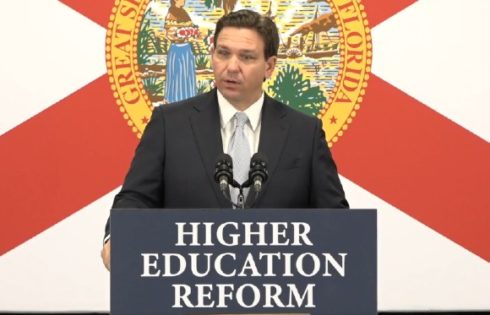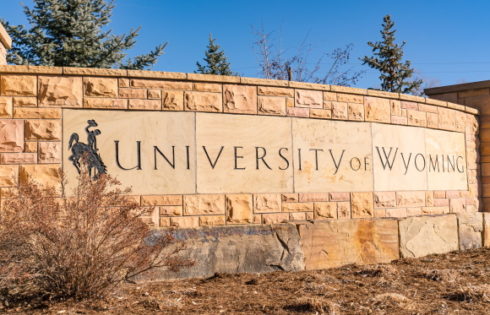
Challenge to Idaho transgender law would reimpose ‘longstanding disparate treatment of women’
The Equal Protection Clause does not require schools to allow biological males to compete in girls’ school sports. If you doubt that, argue with the most left-wing appeals court in the country.
That’s the Justice Department’s argument in a “statement of interest” it filed in the ACLU’s lawsuit against Idaho’s Fairness in Women’s Sports Act, signed into law by Gov. Brad Little this spring.
The law bars “students of the male sex” from competing on “athletic teams or [in] sports designated for females, women, or girls,” and resolves disputes through a physician’s examination of a student’s “internal and external reproductive anatomy” or “genetic makeup.”
The propriety of this law was settled in case law nearly 40 years ago, according to the Justice Department: The 9th U.S. Circuit Court of Appeals explicitly held that the U.S. Constitution’s Equal Protection Clause allows school athletics policies that “preclude boys from playing on girls’ teams, even though girls are permitted to participate on boys’ athletic teams.”
The case concerned the Arizona Interscholastic Association’s policy that blocked boys from competing on girls’ volleyball teams even though girls across sports could compete on boys’ teams. The 9th Circuit upheld the trial court’s finding that “more favorable treatment for females is permissible if such treatment redresses society’s longstanding disparate treatment of women”:
Precluding male students from becoming members of the girls’ volleyball team is a permissible means of redressing the past discrimination against females in high school interscholastic athletic programs.
MORE: Big Sky Conference names male runner ‘female athlete of the week’
The appeals court said that “there seems to be no question” from the “stipulated facts” that high school boys “will on average be potentially better volleyball players than girls” because the former “are taller, can jump higher and are stronger than high school females.” The 9th Circuit upheld the ruling seven years later. (Its rulings are binding on the federal judge in Idaho hearing the lawsuit.)
The ACLU and its clients “neither challenge this precedent nor dispute that Idaho’s Fairness Act adopts the same framework,” the Justice Department filing says:
Instead, they appear to ask this Court to create an exception to this settled understanding of the Equal Protection Clause when the biological males who seek to participate on a female-specific team identify as transgender. But the Fairness Act is on all fours with the policy the Ninth Circuit upheld in the Clark decisions, and nothing about an athlete’s transgender status requires a different result here. … [T]he Constitution does not require Idaho to provide the special treatment Plaintiffs request, under which biological males are allowed to compete against biological females if and only if the biological males are transgender.
In contrast, female school athletes would be denied equal protection under the ACLU’s reading, because keeping boys off their teams “is based on the same exact interest that allows the creation of sex-segregated athletic teams in the first place.”
Even if the ACLU is correct that “circulating testosterone levels” are a “better proxy for physical ability than biological sex,” the Justice Department says, it still has to contend with 9th Circuit precedent that “biological sex is a constitutionally acceptable proxy” because of “average real differences” between males and females. The appeals court only requires that the policy be “substantially related to the goal” under the “intermediate scrutiny” standard it’s using.
In a footnote, the filing challenges the ACLU’s testosterone claim, citing a recent study on the “absolute advantage” of male athletes over females even when the former take “puberty blockers and cross-sex hormones.” The ACLU “never address[es] this study in their Motion.”
MORE: Female track athletes sue Connecticut for ‘extra lessons in losing’
Both the 9th Circuit and the Supreme Court have rebuked the ACLU’s reasoning on the Idaho law enshrining a “paternalistic … sexual stereotype” about women, the Justice Department argues.
Regarding the Arizona volleyball policy, the appeals court said it “simply recogniz[ed] the physiological fact” of “undue advantage” by males, and the high court said a Virginia military academy would “undoubtedly” have to “adjust aspects of the physical training programs” when it started admitting women.
Under the ACLU’s curious reading, Idaho and every other state “would be constitutionally compelled to maintain only co-ed teams and sports—a situation that would obviously harm women,” as the 9th Circuit itself said in the volleyball case, the filing says.
This case is even easier than the volleyball case, according to government lawyers, because nothing is stopping boys who identify as girls from competing on boys’ or coed teams. In the Arizona case, the plaintiffs’ high school did not have a boys’ volleyball team, and yet the 9th Circuit “still upheld the policy as substantially related to an important interest.” (In the 1989 decision that reinforced the 1982 ruling, the court noted there was no girls’ wrestling team, either.)
The ACLU’s argument would actually mandate discrimination, the government warns:
Refusing to provide a special exemption for biological males if and only if they are transgender is hardly a denial of equal protection on the basis of sex, especially when such an exemption would harm biological females. Rather, Plaintiffs’ requested special exemption would actually require Idaho to engage in discrimination on the basis of gender identity, by compelling the State to discriminate against biological males whose gender identity reflects their biological sex.
The Alliance Defending Freedom is representing two female athletes at Idaho State University also seeking to intervene in the lawsuit. Both lost races against an athlete who first competed in the male category as Jonathan Eastwood and then switched to the female category as June Eastwood, getting “knocked down a placement level.”
MORE: Female college athletes ask for consideration in ACLU lawsuit against Idaho
IMAGE: Wavebreak Media/Shutterstock
Like The College Fix on Facebook / Follow us on Twitter






Please join the conversation about our stories on Facebook, Twitter, Instagram, Reddit, MeWe, Rumble, Gab, Minds and Gettr.